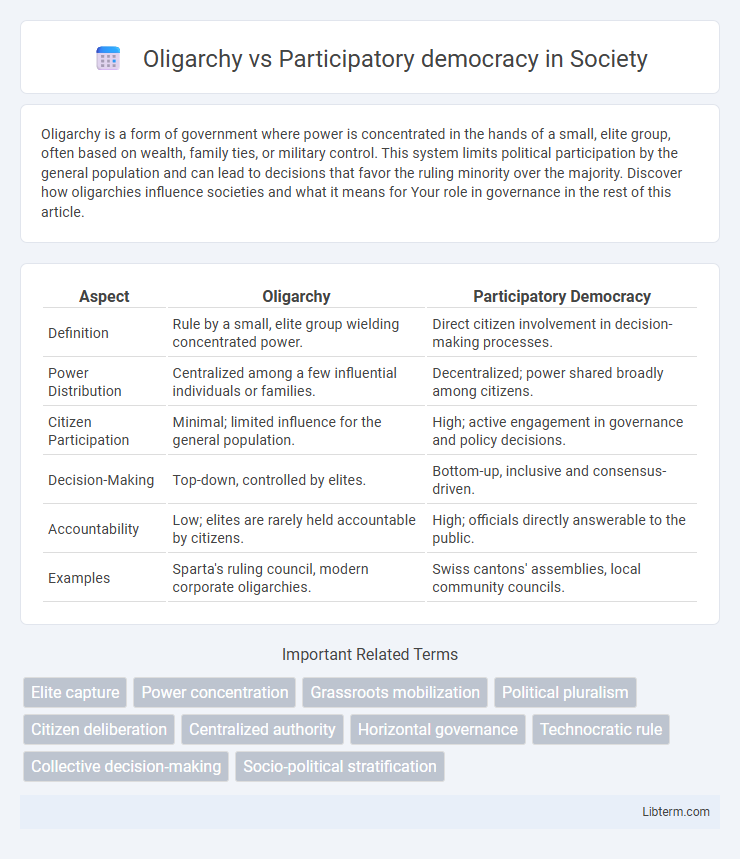Oligarchy is a form of government where power is concentrated in the hands of a small, elite group, often based on wealth, family ties, or military control. This system limits political participation by the general population and can lead to decisions that favor the ruling minority over the majority. Discover how oligarchies influence societies and what it means for Your role in governance in the rest of this article.
Table of Comparison
| Aspect | Oligarchy | Participatory Democracy |
|---|---|---|
| Definition | Rule by a small, elite group wielding concentrated power. | Direct citizen involvement in decision-making processes. |
| Power Distribution | Centralized among a few influential individuals or families. | Decentralized; power shared broadly among citizens. |
| Citizen Participation | Minimal; limited influence for the general population. | High; active engagement in governance and policy decisions. |
| Decision-Making | Top-down, controlled by elites. | Bottom-up, inclusive and consensus-driven. |
| Accountability | Low; elites are rarely held accountable by citizens. | High; officials directly answerable to the public. |
| Examples | Sparta's ruling council, modern corporate oligarchies. | Swiss cantons' assemblies, local community councils. |
Defining Oligarchy and Participatory Democracy
Oligarchy is a political system where power is concentrated in the hands of a few individuals or a small group, often based on wealth, family ties, or military control, limiting broad citizen involvement. Participatory democracy emphasizes direct engagement and decision-making by the general population, allowing citizens to influence policies and governance actively beyond just voting in elections. These contrasting definitions highlight the concentration versus diffusion of political power and citizen participation in governance processes.
Historical Origins and Evolution
Oligarchy traces its origins to ancient Greek city-states like Sparta, where power concentrated in a small, elite group controlling political and economic resources. Participatory democracy evolved from Athens' direct democratic practices, emphasizing broad citizen engagement in decision-making processes during public assemblies. Over time, oligarchic systems often solidified through hereditary or wealth-based rule, while participatory democracy expanded through institutional reforms promoting inclusive political participation and civic rights.
Core Principles and Values
Oligarchy is characterized by concentrated power in the hands of a few individuals or families, prioritizing control, hierarchy, and exclusivity in decision-making. Participatory democracy emphasizes broad citizen involvement, equality, and collective deliberation, ensuring that diverse voices influence policy and governance. The core values of oligarchy focus on authority and stability, while participatory democracy centers on inclusiveness and empowerment.
Decision-Making Mechanisms
Oligarchy centralizes decision-making power in the hands of a small elite group, often limiting public input and transparency. Participatory democracy distributes decision-making authority among a wide pool of citizens, ensuring broad engagement through mechanisms like public consultations, referendums, and community assemblies. This inclusive approach fosters accountability and diverse representation, contrasting sharply with the concentrated control found in oligarchic systems.
Distribution of Power
Oligarchy centralizes power in the hands of a few elite individuals or groups, concentrating decision-making authority and limiting political participation. Participatory democracy disperses power broadly among citizens, promoting inclusive engagement and direct involvement in governance processes. This fundamental contrast in power distribution shapes how effectively societies respond to diverse interests and demands.
Citizen Involvement and Representation
In oligarchies, citizen involvement is minimal as power is concentrated in the hands of a small, elite group, limiting broad public participation and reducing diverse representation. Participatory democracy emphasizes direct citizen engagement in decision-making processes, fostering greater inclusivity and ensuring that various community interests are represented. This model enhances accountability and responsiveness by involving a wider population in shaping policies and governance.
Advantages and Strengths
Oligarchy offers streamlined decision-making through concentrated power, enabling swift policy implementation and consistent governance by a small, experienced elite. Participatory democracy empowers citizens to engage directly in decision processes, enhancing legitimacy, accountability, and public trust through broad-based involvement. The participatory model fosters diverse perspectives and civic responsibility, while oligarchy excels in stability and efficiency in complex or crisis situations.
Weaknesses and Criticisms
Oligarchy concentrates power within a small elite, leading to limited public participation and potential corruption, which undermines democratic legitimacy. Participatory democracy faces challenges of feasibility, as extensive citizen involvement can result in decision-making inefficiencies and unequal participation due to socio-economic disparities. Both systems can struggle with representation: oligarchy due to exclusivity, and participatory democracy due to the risk of marginalizing less active or informed citizens.
Real-World Examples and Case Studies
Oligarchy concentrates power in the hands of a few elites, exemplified by Russia's political system where decision-making is dominated by a select group of wealthy individuals and political insiders. Participatory democracy encourages direct citizen involvement, seen in Switzerland's frequent referenda allowing citizens to influence legislation actively. Case studies from Brazil's participatory budgeting in Porto Alegre reveal enhanced community engagement and resource allocation compared to oligarchic models, highlighting distinct governance outcomes.
Future Prospects and Emerging Trends
Oligarchy faces increasing challenges as digital technologies and social media amplify demands for transparency and citizen engagement, reshaping power dynamics. Participatory democracy benefits from blockchain-based voting systems and decentralized platforms, enhancing inclusivity and real-time public input in decision-making processes. Emerging trends indicate a hybrid governance model integrating oligarchic efficiency with participatory mechanisms to address complex global issues and technological disruptions.
Oligarchy Infographic

 libterm.com
libterm.com